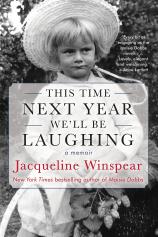Reading Group Guide
Discussion Questions
This Time Next Year We'll Be Laughing: A Memoir

1. In your opinion, how much of this memoir is Jacqueline Winspear’s own story, and how much is it her parents’? Is she offering anecdotes from her parents’ lives in order to contextualize her own life story, or because they have become her own life story --- or both? If you were to write a memoir about your own life, how much about your own family, good and bad, would you include?
2. On memoir, Winspear says, “We don’t just look back at an event in our past; we are remembering the memory of what happened.” What do you think she means by that? Is that how you would describe memoir? How are memory, memoir and history similar or different?
3. Winspear’s hop-harvesting childhood in the 1950s and 1960s was spent largely in the Kentish countryside, where she lived in a medieval cottage with no bathroom and where she worked with migratory laborers whose ancestors had been coming to Kent for seasonal harvests for generations. To what degree do you think this lifestyle has vanished? Do you think children born today will see as much profound social and lifestyle change in 60 years?
4. In several episodes from her childhood, Winspear describes being profoundly affected by things she learned about women who lived in her neighborhood; in several cases, she recollects that their stories pointed her toward novels she would later write. Do you have personal memories like this from your childhood --- people who you might not have known well, but whom you still think about decades later because of something they said or did, or who affected the way you think or live your life?
5. The title of the book comes from Winspear’s father’s oft-repeated saying during hard times, “This time next year we’ll be laughing.” Do you relate to that phrase? Were there particular examples of perseverance during hard times in the book that resonated with you? Do you or does someone in your family have a maxim that you look to for reassurance?
6. What do you think of Winspear’s relationship with her mother? Was she a good mother? Is it fair to ever label a woman a “good” or “bad” mother? What about Winspear’s father?
7. The theme of war-era PTSD runs through the personal stories of both sides of Jacqueline Winspear’s family, and she discusses the scientifically proven theory that traumas can be hereditary. Is her family story a very British one? Or are there comparable or analogous American stories about the “Greatest Generation” or the generation born between the two World Wars?
8. In addition to trauma-related PTSD, Winspear broaches the little-discussed phenomenon of secondary PTSD --- the physical and mental toll endured by first responders, social workers and historians of the traumatic experiences of others. In extreme cases, scholars and writers have suffered even more severe repercussions from their work than the ones Winspear frankly describes --- even death. What is your opinion about the cost of historical preservation and education? Do historians and writers have an obligation to push themselves out of their own comfort zones, even at a high physical and psychological price? Is “safe” history possible? If it is not, how do we determine a reasonable human price to pay in order to tell the truth?
This Time Next Year We'll Be Laughing: A Memoir
- Publication Date: September 28, 2021
- Genres: Memoir, Nonfiction
- Paperback: 312 pages
- Publisher: Soho Press
- ISBN-10: 1641292946
- ISBN-13: 9781641292948







